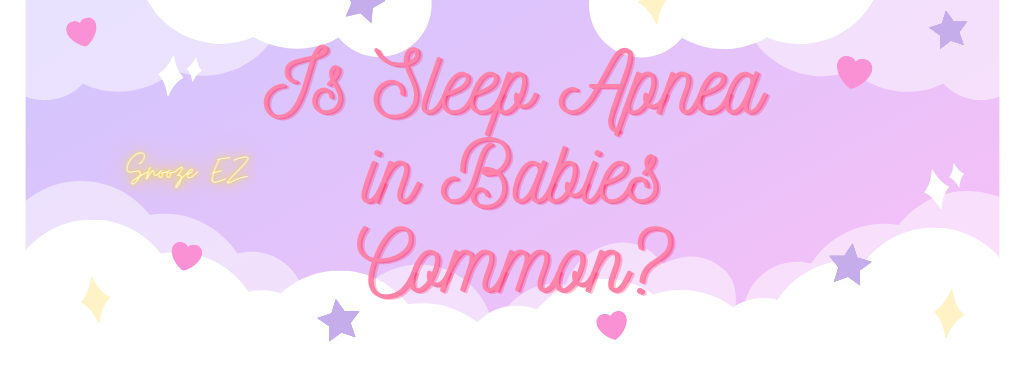Babies born at 28 weeks and under, almost all experience apnea. Babies at 33-35 weeks are around 50%. Then, full-term is only 1-5%.
Sleep apnea is a serious and potentially life-threatening condition that affects both adults and children. While it is more commonly associated with adults, sleep apnea can also occur in babies.
I’m Aaron, a sleep disorder expert. In this article we will discuss how common sleep apnea is in babies, what the signs and symptoms are, and what treatments are available.
Sleep apnea can be a frightening diagnosis for parents to receive, but understanding it is the first step in finding proper treatment.
How Common Is Sleep Apnea In Babies?
Sleep apnea, a potentially serious condition that occurs when an infant stops breathing during sleep and is surprisingly common in preemies.
A study published in the journal Pediatrics found that nearly all infants born at 28 weeks or earlier experience apnea and around 50 percent of those born between 33 and 35 weeks do as well. Fortunately, full-term babies are relatively rare when it comes to this condition; only 1-5 percent of full-term babies experience apnea.
It’s important to note that not all cases of sleep apnea will have outwardly noticeable symptoms like pauses in breathing or irregular movement during sleep. Parents should be aware of signs like snoring and gasping for air which can indicate a more severe case of the condition.
However, not all cases of sleep apnea will have outwardly noticeable symptoms like pauses in breathing or irregular movement during sleep. In fact, many cases may go unnoticed until the child reaches toddler age or beyond.
It’s important to note that parents should be vigilant about their child’s well-being, even if there are no outwardly visible signs of sleep apnea.
Common indicators of sleep apnea in babies include:
- Pauses in breathing lasting 20 seconds or longer (this is the most common symptom)
- snoring loudly and frequently
- struggling breathing
- frequent respiratory infections
- swallowing issues
- slower development
- mouth breathing
- difficulty staying asleep through the night
- sweating excessively while sleeping
- frequent bed wetting
- difficulty concentrating or paying attention throughout the day
Causes of Sleep Apnea in Babies
Common causes of sleep apnea in infants include:
- enlarged tonsils and adenoids
- abnormalities of the airway
- prematurity and poor muscle tone
- obesity
- allergies
- infections
- medical conditions such as neuromuscular disorders
- acid reflux (GI disorders)
- cleft palate
- secondhand smoke
How Are Babies Diagnosed With Sleep Apnea?
Sleep, breathing patterns, heart rate, and more are all monitored within the first 24 hours when a baby is born.
Any concerns will be noted during this time and further tests would be ran and completed.
After the baby leaves the hospital, it is up to the parents and pediatrician to monitor and report any of the symptoms mentioned above.
If there are any real concerns, your pediatrician may refer your baby to a sleep specialist for further tests.
These tests are what to expect to diagnose or rule out sleep apnea:
- A general physical exam – doctor will listen to heart beat, breathing, etc.
- Endoscopy – to examine the throat and airway
- X-rays – these can help get a visual of any bone structure issues in the neck/head area
- Polysomnography – this is a monitored sleep apnea test that lasts through the night while your baby sleeps
Treatments For Babies With Sleep Apnea
Treatments vary with babies who have been diagnosed with sleep apnea. It can depend on medical conditions he/she might have or how severe the sleep apnea is.
The good news is most babies grow out of it by the time they reach 44 weeks. If they don’t, then it depends if the baby has obstructive or central sleep apnea.
Obstructive sleep apnea (OSA) may be something that takes even more time to monitor to see if the baby grows out of the symptoms, such as the neck and head developing and the obstruction naturally fixing itself.
If not, then CPAP (continuous positive airway pressure) may be used or surgery to remove the obstruction. Again, this depends the severity of the obstruction.
Central sleep apnea, though more rare, is of the nervous system or caused by another underlying health condition. These symptoms can also resolve or get better on their own over time.
Most importantly, your pediatrician or specialist will advise what needs to be done if circumstances were to go as far as requiring treatment for both types of sleep apnea.


